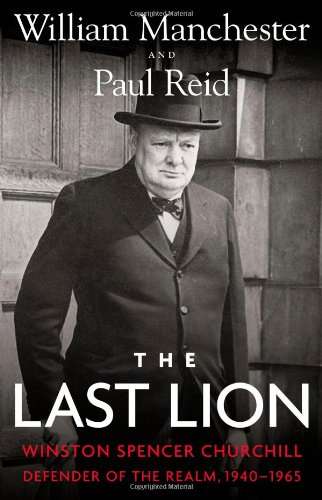Bad Advice Wednesday: Never Surrender! (But be Flexible)
categories: Bad Advice
2 comments
 I have been sick the last few days and have spent most of my time, not with my family or on my work, but in bed with Winston Churchill. I’m on page 742 of The Last Lion, the third part of the great Churchill biography begun by William Manchester, who wrote the first two volumes and did the research for the third, and finished up, quite ably I think, by a journalist named Paul Reid.
I have been sick the last few days and have spent most of my time, not with my family or on my work, but in bed with Winston Churchill. I’m on page 742 of The Last Lion, the third part of the great Churchill biography begun by William Manchester, who wrote the first two volumes and did the research for the third, and finished up, quite ably I think, by a journalist named Paul Reid.
It is always fun and inspiring to hang out with Churchill. I love that during WWII when he is flying on a plane with no heat or oxygen, he has the crew design a special oxygen mask so that he can still smoke his cigar. I love that he snorts when someone offers him tea and says that his tea is yellow (whisky). And I love that when he is monologuing while steaming across the Atlantic, and Lord Beaverbrook dares interrupt him, he pats the Beaver on the knee and says “You don’t talk anymore.” (For a different kind of Churchill humor, see our post on National Lampoon’s “The Churchill Wit.”)
But this is Bad Advice Wednesday (something Churchill, sadly, never lived to see) and so it won’t do to just pass along Churchill quips. You are hungry for advice after all! And it turns out that Winston has come for you:
“We shall fight on the beaches, we shall fight on the landing grounds, we shall fight in the fields and in the streets, we shall fight in the hills; we shall never surrender.”
And:
“Never give in, never give in, never, never, never, never—in nothing, great or small, large or petty—never give in except to convictions of honor and good sense.”
These quotes might seem, at first glance, a tad extreme to scribble on a note card and tape above your writing desk. I don’t think they are. For a young writer it is always England in 1940. You are under siege and you stand alone and your enemies are trying to destroy you. No one is going to be at all surprised if you call it quits and run up a white flag, just like everyone else in the world is doing. And don’t expect to have too many allies, at least at first.
Anyone who has read these pages knows that I believe a certain martial, or at least disciplined and athletic, attitude toward one’s work is, if not necessary, at least helpful, in particular when tackling larger projects. But if that’s all you have going for you you will likely end up turning out propaganda or self-help books, not literature. It starts with energy, with pushing yourself out of inertia, but it had better not end there.
With Churchill it didn’t end there. Those who just think of him as a symbol of massive will-power and war-like resolve don’t know the half of it. The other half was an artist who, like Keats, was able to live comfortably in uncertainties. In fact, he flourished in uncertainty, had a genius for it, which is why he drove more logical minds like Eisenhower and Marshall and to some extent Roosevelt, so crazy. Flexibility and opportunism were his watchwords.
Paul Reid writes:
Churchill later reduced the differences in strategic thinking to a few choice phrases. The Americans, he wrote, “feel that once the foundation has been planned on true and comprehensive lines all other stages will follow naturally and almost inevitably. The British mind does not work quite in this way. We do not think that logic and clear cut principles are necessarily the sole keys to what ought to be done in swiftly changing and indefinable situations.” These ideas informed Churchill’s strategic thinking. Its essence was, “to assign a larger importance to opportunism and improvisation, seeking rather to live and conquer in accordance with the unfolding event than to aspire to dominate it, often by fundamental decisions.”
In other words, be firm in resolve but flexible in practice.
Sounds like some good bad advice.


I tried to be bad.
This is actual good, what went wrong?